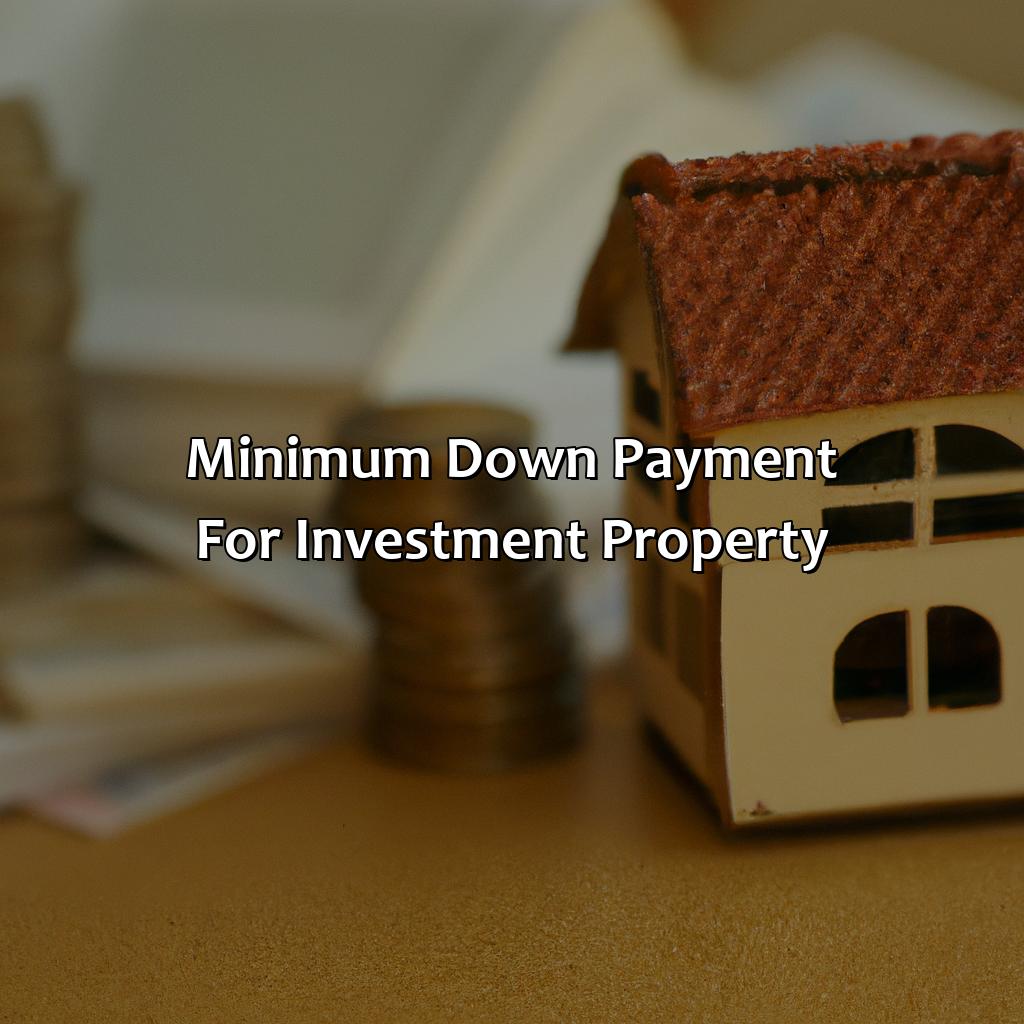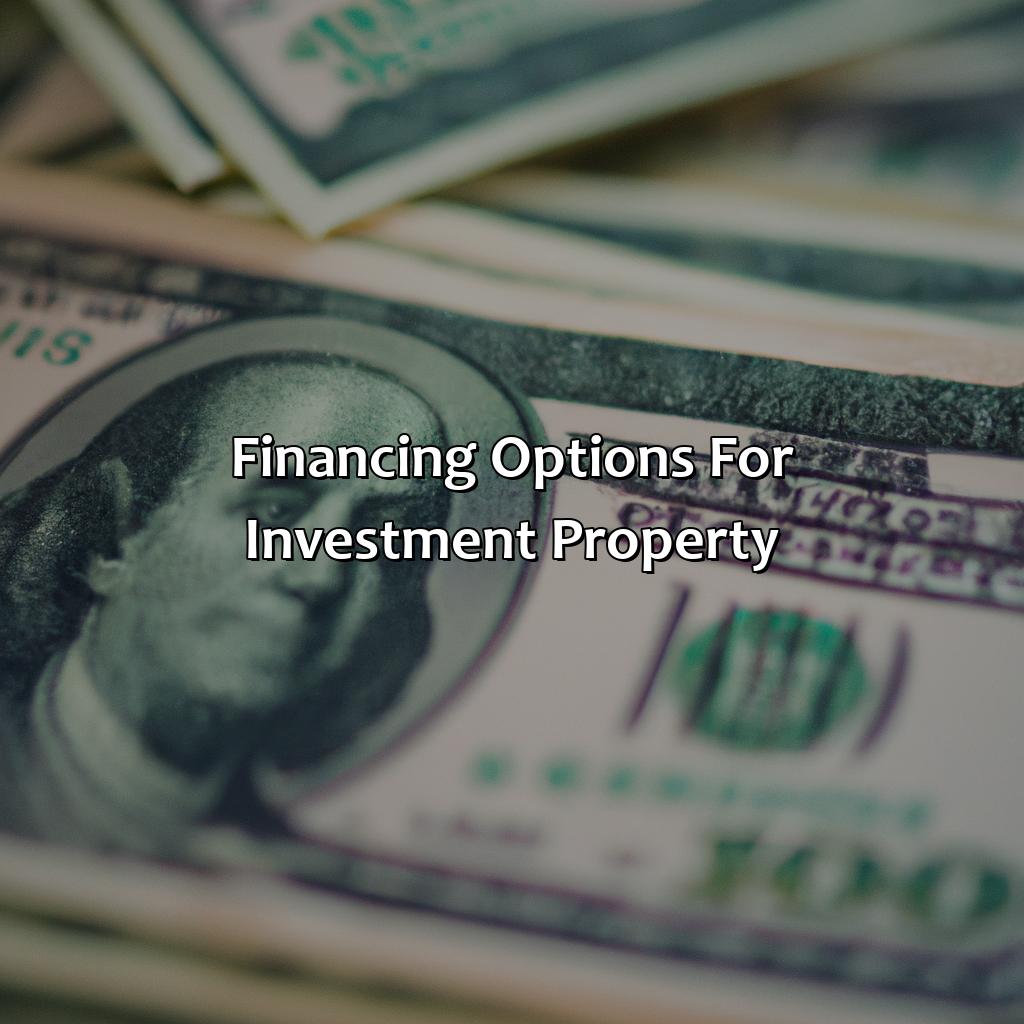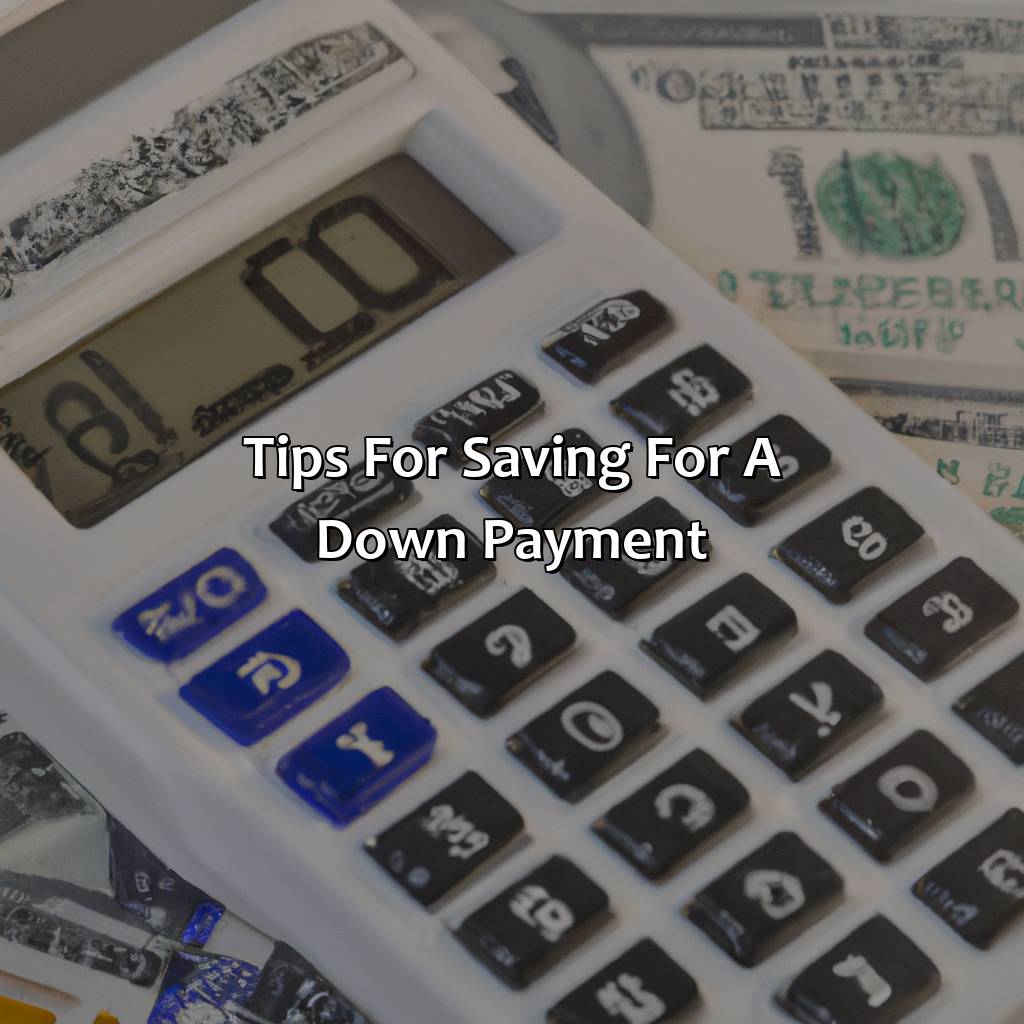How Much Do You Need Down For An Investment Property?
Key Takeaway:
- Investment properties generally require a larger down payment than a primary residence; typically between 15-25%. This is due to the higher risk associated with these types of properties and the potential for income fluctuations.
- The required down payment for an investment property depends on multiple factors such as credit score, debt-to-income ratio, and the type of loan being used. For example, conventional loans typically require a larger down payment compared to FHA or VA loans.
- Creative financing strategies such as partnering with other investors, seller financing, hard money loans, and home equity loans can be utilized to minimize the amount of cash required for a down payment. However, it is important to evaluate the potential risks associated with these methods before proceeding.
Are you considering investing in property but don’t know how much you need for a down payment? You’re not alone! Find out how much you need for an investment property in this article.
Minimum Down Payment for Investment Property
To fathom the amount of down payment needed for an investment property, the answer lies in assessing the minimum down payment necessitated.
Let’s look into the importance of putting down a payment, and the factors that have an effect on the requisite down payment in this segment on minimum down payment for investment property.

Image credits: retiregenz.com by Joel Woodhock
Importance of a Down Payment
Putting Money Down: Essential for Investment Property Acquiring
Acquiring an investment property may seem daunting, but putting a minimum down payment on it is crucial in securing a profitable investment. A down payment can determine the amount of money you need to borrow from lenders and can affect your loan’s interest rates and financing terms.
Notably, the down payment amount required varies depending on the type of loan and property you’re acquiring. For instance, it’s possible to put as little as 3.5% down on an FHA loan, but this only applies when purchasing a multi-unit property with up to four units.
It’s important also to note that before securing any loan or making any significant financial decision for any investment property acquisition, detailed research and consultations must be conducted with experts beforehand.
Statistics show that many successful real estate investors accomplished their investments through well-planned savings to prepare at least 20% of total expenses cost as a down payment. Investing with careful research, dedication, and knowledge will make your venture secure.
Prepare to dip deeper into your pockets as we unravel the factors that impact the down payment for your investment property.
Factors Affecting the Required Down Payment
Maintaining the minimum down payment for investment properties is crucial. Several factors affect the required down payment, such as credit score, property type, financing type, DTI, and location.
Below are some of the factors that affect the required down payment:
- Credit Score: Investors with higher credit scores have access to lower interest rates and can qualify for better mortgages and deals.
- Property Type: The down payment could vary based on whether a single-family home or a multifamily property is being invested in.
- Financing Type: Government-backed loans usually require lower down payments than conventional loans.
It’s essential to remember that different locations have varying real estate markets that affect the minimum down payment amount. Understanding these small but important nuances can be beneficial when deciding how much money you need to put down on an investment property.
Pro Tip: Investing in an expert’s advice can help to avoid any costly errors while ensuring that you get the maximum returns possible.
Get rich or die trying? No thanks, I’ll just explore the financing options for my investment property instead.
Financing Options for Investment Property
To finance your investment property, investigate different options. These include:
- Conventional Loans
- FHA Loans
- VA Loans
- Private Money Lenders
This section, “Financing Options for Investment Property,” in “How much do you need down for an Investment Property?” will give you an introduction to these. Then, determine which financing works best for your investment.

Image credits: retiregenz.com by Harry Washington
Conventional Loans
Loans obtained via traditional means, with set terms and rates to purchase or refinance an investment property are referred to as standard loans. Conventional loans are the most common financing options for property investment and have varying down payment requirements ranging from 3% to 20%.
The amount required as a down payment is determined by several factors, including credit rating, the value of the property, and how many other properties you already own. A higher down payment typically leads to more favorable loan terms like lower interest rates and reduced monthly payments.
An excellent way to optimize your chances of obtaining a conventional mortgage loan is by having a minimum credit score of 620 or higher. Having this score gives lenders confidence in your financial position, especially if you also have sufficient reserves to cover payments beyond closing expenses.
Pro tip: To secure ideal financial loans, it’s necessary to provide accurate documentation right away when applying for finance on your preferred real estate investment.
Want to finance your investment property with a lower down payment? FHA loans might just be the government’s way of saying, ‘We got you, fam.’
FHA Loans
For investment property, Federal Housing Administration Loans have lower down payment requirements. You can put down as low as 3.5% of the purchase price to obtain FHA-backed financing for up to four units.
These loans are backed by the government, which means that lenders have less risk when lending to borrowers who may not have strong credit scores or large amounts of cash reserves. This flexibility makes FHA loans an attractive option for first-time homebuyers and those with lower income levels.
Furthermore, FHA loans also come with more lenient underwriting guidelines compared to traditional mortgage loans, such as the ability to add non-occupying co-borrowers and consider alternative credit data.
When it comes to specifics, FHA loan limits vary depending on the location of the investment property, but typically range from $356,362 for a single-family unit up to $685,400 for a four-unit building. Interest rates may be slightly higher than conventional loans and require monthly insurance premiums.
Interestingly enough, the program was established during the Great Depression in 1934 as part of President Roosevelt’s New Deal reforms aimed at promoting homeownership and providing support to banks amidst economic hardship.
Don’t have military experience? No worries, VA loans are still an option for investment properties- finally, a way to put that camo couch to good use.
VA Loans
For US military veterans, there’s an excellent financing option available to invest in property – a VA loan. These home loans come with lower interest rates and often require no down payment, making them an attractive choice for those looking to invest in real estate. With a VA loan, there is no mortgage insurance required, which can save veterans thousands of dollars over the life of their loan.
When it comes to investment properties, VA loans have specific restrictions. Veterans must live in the property for at least one year before renting it out. Additionally, the property must meet certain requirements set forth by the VA. However, if these conditions are met, VA loans offer great benefits for veterans who want to invest in real estate.
It’s important to note that not all lenders offer VA loans for investment properties or may have stricter requirements than the VA itself. To take advantage of this great financing option, veterans should research different lenders and find one that can work with their unique situation.
Don’t miss out on the benefits of a VA loan when investing in real estate as a veteran. Ensure you fulfill the requirements set forth by both your lender and the VA to take advantage of this incredible opportunity.
Private Money Lenders: The only ones who won’t judge you for borrowing money for a questionable investment property.
Private Money Lenders
Alternative Financing Options for Real Estate Investment
Investment properties can be funded through various means, including using private investors or firms. These non-institutional sources of financing are called alternative financing options and offer more flexible terms than traditional lending institutions.
Private Lenders give investors access to immediate capital without waiting for long approval processes by banks. However, these loans come with higher interest rates and shorter repayment periods than conventional mortgage lenders. Nonetheless, alternative private finance can also provide creative solutions such as no-money-down funding which could result in the acquisition of prime investment properties with minimal initial cost.
In addition to private money lenders, other alternative financing options include crowdfunding and self-directed IRAs. Crowdfunding platforms enable multiple investors to contribute small amounts of funds towards a larger project while Self-directed IRAs allow investors to use retirement funds instead of traditional savings for investment purposes.
It is advised that potential real estate investors take their time to research thoroughly on all financing opportunities available before selecting the most suitable option. Investors should also have a clear understanding of the risk involved in each financing mechanism before committing any significant amount of money.
When it comes to financing strategies for investment properties, sometimes you have to get a little creative – like convincing your rich uncle to invest in your dream of becoming a real estate tycoon.
Creative Financing Strategies
Discover ways to finance your investment property. Partner with investors, negotiate with sellers, go for hard money loans, or take out equity from your primary home with a home equity loan. Each of these offers something different; know the pros and cons before you make a decision.

Image credits: retiregenz.com by Harry Woodhock
Partnering with Other Investors
Collaboration with other investors is an alternative way to gain financial resources for an investment property. It can provide the necessary equity requirement and increase buying power. Moreover, it helps in sharing management responsibilities and tasks that accompany the investment property.
One benefit of partnering is the ability to leverage each other’s strengths, skills, and experiences. This will reduce individual risk levels and enhance the diversification of portfolios. Forming a cohesive team with transparent communication ensures everyone shares the same goals and objectives.
To effectively partner with another investor, both parties must understand their roles, how the division of labor works, responsibilities, and ownership structure. Create a legal agreement defining every aspect of working together. Identify an approach to manage disagreements or potential conflicts as they arise.
Chloe was struggling to save up enough capital for her first real estate project when she met Candice at a networking event. After exchanging ideas and portfolio interests, they formed a partnership that allowed Chloe to contribute her management experience while Candice funded the initial purchase of their rental property venture. They worked successfully together for several years until it was time for them to sell the property as they had reached their target return on investment (ROI).
Who needs a bank when you can borrow from the seller? It’s like getting a loan from your grandma, but with better interest rates.
Seller Financing
One way to obtain funding for investment properties is through the use of creative financing strategies. When it comes to purchasing a property, seller financing can be an option worth exploring. This entails negotiating with the seller to provide financing for all or a portion of the purchase price, instead of relying on traditional mortgage lenders.
Seller financing offers various benefits, such as requiring little to no down payment and a faster closing process, freeing up cash that can be put towards improving the property or other investments. Additionally, buyers who may not qualify for traditional loans due to issues like credit history or income streams may have a better chance of obtaining financing through seller financing.
When considering this option, it’s critical to conduct thorough due diligence and ensure clear terms are established within the agreement. In some cases, higher interest rates or shorter repayment periods may be involved in exchange for the flexibility provided by seller financing.
Other options for creative financing include private lenders and securing funds from equity partners. Each strategy has its unique requirements and advantages; therefore, evaluating each approach carefully according to your current goals is key before deciding on which method best fits what you’re aiming to accomplish in real estate investing.
To make these strategies work correctly, it’s essential to have solid understanding in financial analysis so you can confidently justify and validate your investment decisions. Enhanced knowledge about market trends including rent growth patterns are also valuable tools that enable you to ensure profitability when making investments on properties.
Remember, if traditional financing fails, hard money lenders are there to make your dreams a reality… for a price.
Hard Money Loans
When looking for investment property financing, one option is to consider Short-Term Bridge Loans. These types of loans, also known as Hard Money Loans, are typically offered by private investors or companies and require collateral such as the property itself. They have higher interest rates than traditional loans but provide quick access to funds and can be a good option for those with less than ideal credit.
With Hard Money Loans, borrowers can often secure up to 70% of the property’s after-repair value (ARV) which allows for more flexibility in terms of down payment requirements. However, these loans should only be considered for short-term investments since they tend to have a repayment term of just six-months to three-years.
It’s worth noting that when choosing a Hard Money Lender, it’s important to do your research and ensure they have a solid reputation within the industry.
According to Forbes Finance Council, “Hard Money Loans can provide investors with necessary bridge financing in situations where traditional lending may not be available.”
Want to borrow against your home to invest in another property? Just remember, it’s all fun and games until someone forecloses.
Home Equity Loans
Accessing your property’s equity is one option for financing investment properties. By utilizing the value of your home, borrowers can obtain a loan using their home as collateral. This is typically referred to as leveraging your home’s equity.
Home equity loans allow homeowners to access cash for various uses ranging from home renovations to purchasing an investment property. Lenders often offer different types of home equity loans, such as fixed interest or line of credit.
Additionally, utilizing a Home Equity Loan may provide tax benefits if the funds are used towards improvements on the property. These improvements can increase the overall value of the house and thus provide an added benefit when it comes time to sell.
According to Forbes Magazine, “The amount of equity homeowners now have is substantial – over $7 trillion.” This indicates that many individuals have a valuable asset they can access for financing their investments.
Save money on groceries by only eating ramen and water until you have enough for a down payment.
Tips for Saving for a Down Payment
Save for a down payment to buy an investment property? Here’s how!
- Make a budget.
- Cut expenses.
- Take advantage of investments.
- Up your income.
This will help you fill your down payment fund. For more specific ideas, look into the sub-sections. Achieve your financial goal today!

Image credits: retiregenz.com by Adam Jones
Developing a Budget
Setting Financial Boundaries for Home Investments
Setting boundaries is a crucial part of budgeting for home investments. Without them, investors may find themselves unable to sustain long-term financial goals. Here are six steps that can help set the necessary financial boundaries:
- Assess current expenses and income:
- Estimate future housing expenses:
- Calculate total estimated costs:
- Determine available cash reserves:
- Create a plan:
- Maintain the plan:
Before creating a budget, it is essential to have an idea of the inflow and outflow of finances. Investors must track their expenses and calculate their income accurately.
Investors must consider different variables like mortgage payments, utilities, property taxes, and insurance while calculating future housing expenses.
After estimating the different costs associated with the home investment, an investor must add them up to get a rough estimate of expected expenses.
Available cash reserves are crucial when investing in a home. Investors must determine how much they can spare after paying their monthly bills like credit cards and other loans.
Once every estimate has been calculated, an investment plan can be created by balancing all the existing factors.
The final step is executing on the created investment plan and continuously updating it based on new circumstances.
When investing in housing – starting early and prioritizing savings will yield desired outcomes more consistently.
Investors should not underestimate the power of smart savings habits when investing in homes. By commencing early and sticking to planned budgets; future problems can be prevented even before they arise.
Saving money is like trimming a bonsai tree, painful but necessary if you want it to grow – just like your down payment for that investment property.
Cutting Expenses
Reducing the Outgoings
One of the best ways to accumulate more wealth for an investment property is by minimizing expenses. Every penny matters when saving for a down payment. Here are a few Semantic NLP variations on how to reduce your expenses:
- Cutting out subscription services and memberships that you don’t use
- Reducing utility bills by conserving power or switching providers
- Cooking more meals at home and cutting back on takeouts and dining out
- Shopping during sales season and buying generic products wherever possible
- Refinancing loans and consolidating debts to lower interest payments
- Downsizing your living space or getting a roommate
In addition to these points, it’s also a good idea to double-check your bank statements for any unnecessary charges or fees. By following these tips for reducing expenses, you’ll be able to save more money each month towards your future investment property without altering your quality of life.
You may also want to consider finding some part-time work or freelancing opportunities if you have some extra time on hand. Earning additional income may add up quicker than you might think, increasing your savings potential even faster.
Ultimately, it’s all about making small changes in everyday life that will help you save in the long run. Take a mindful approach towards finances to create a better future investment property journey!
Don’t wait for the perfect investment opportunity to come knocking, sometimes you have to kick down the door and make your own luck.
Taking Advantage of Investment Opportunities
Investment properties present excellent opportunities to increase wealth. A well-planned investment can provide good returns and help diversify a portfolio. However, securing an investment property requires careful planning and financing.
One must have a clear idea of their budget, financial goals, credit score and down payment amount needed for investment property financing. When deciding on the down payment amount, there are many factors to consider such as area/market conditions, property type, rental potential, etc. With these in mind, prospective investors can make informed decisions about how much cash they need to put down.
To maximize investment opportunities, it is beneficial to seek out professional advice from real estate agents or financial advisors. They can provide valuable insights into the market and help guide investors towards making financially sound decisions.
Pro Tip: Saving early and consistently will help build up necessary funds for a down payment while reducing the overall risk of investing in property.
Time to put those dance lessons to use and start street performing, because every little bit helps when it comes to boosting your income for that dream investment property.
Boosting Your Income
To increase your revenue for investment property, there are different techniques you can use:
- Extra Income: Increasing your income by taking a side job or starting a small business on the side.
- Negotiation Skills: Improving your negotiation skills to get a better salary increment or commission in your existing job.
- Investments: Make investments so that passive income may help increase regular cash flow.
Apart from these methods, being consistent with all payments and investing in long-term, secure stocks could also prove beneficial.
Real estate investments are complicated and not every investment plan is beneficial. However, if done correctly, they can result in significant net worth growth over time.
Five Facts About How Much You Need Down for an Investment Property:
- ✅ Typically, lenders require a down payment of 20-25% for investment properties. (Source: Rocket Mortgage)
- ✅ The amount you need for a down payment may vary depending on the type of investment property, your credit score, and other factors. (Source: The Balance)
- ✅ Some lenders may require a higher down payment if you don’t plan to live in the property. (Source: Realtor.com)
- ✅ You may be able to finance your down payment through a personal loan, but this may increase your overall interest rate and costs. (Source: Forbes)
- ✅ It’s important to consider all the costs associated with owning an investment property, including property taxes, maintenance, and potential vacancy periods. (Source: NerdWallet)
FAQs about How Much Do You Need Down For An Investment Property?
How much do you need down for an investment property?
Typically, a down payment of 20% of the purchase price is required for an investment property. However, some lenders may require a higher down payment depending on the borrower’s creditworthiness and the property’s location and condition.
What if I don’t have a 20% down payment?
If you don’t have a 20% down payment, you may still be able to purchase an investment property. You can explore options such as putting down a larger down payment, finding a co-investor, or getting a loan with Private Mortgage Insurance (PMI).
Can I use equity from my primary residence to make a down payment on an investment property?
Yes, you can use the equity from your primary residence to make a down payment on an investment property. This is called a home equity loan or line of credit. However, it’s important to evaluate the risks associated with borrowing against your home before proceeding with this option.
What other costs do I need to consider besides the down payment?
Besides the down payment, you will need to consider closing costs, which can range from 2-5% of the purchase price, and ongoing expenses such as property taxes, insurance, maintenance, and repairs. It’s important to factor in all of these costs to ensure that the investment property will be profitable.
Can I buy an investment property with a low credit score?
Havig a low credit score can make it more difficult to secure financing for an investment property, and lenders may require a higher down payment. However, it’s still possible to buy an investment property with a low credit score by exploring alternative financing options such as hard money loans or partnering with a co-investor.
Do different types of investment properties require different down payments?
Yes, the down payment required for an investment property will vary depending on the type of property. For example, a multi-unit property may require a higher down payment than a single-family home. Additionally, the location and condition of the property can also impact the required down payment.
